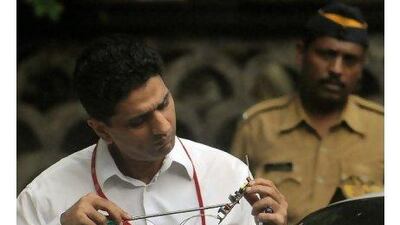MUMBAI // Terror appears to haunt the footsteps of Mukesh Agarwal.
Nearly three years ago, he was running his food stall inside Mumbai's Chhatrapati Shivaji Terminus when two gunmen from the Pakistan-based Lashkar-i-Taiba group strolled through the station shooting commuters.
Nearly 60 people died at that location; Mr Agarwal still has a bullet in his hip from that attack.
On Wednesday evening, Mr Agarwal was in the suburb of Dadar West, on his way to a temple.
Five minutes after he passed through a particular spot, a bomb went off there - one of three that exploded across the city, killing 17 and injuring more than 100 people.
Since the blasts, the government's security apparatus has patted itself on the back for responding far quicker than it did during the November 26, 2008 attacks.
On 26/11, as it has come to be known here, elite security forces remained absent for several hours, leaving Mumbai's constables to deploy their ancient rifles or lathis (heavy wooden sticks) against AK-47-wielding terrorists.
At a press conference on Thursday, the Indian home minister, P Chidambaram, said: "The Mumbai police are better trained, better equipped and better motivated to deal with terror attacks."
But Mr Agarwal is unimpressed. "They're saying they responded faster, but I saw that they still had to fly down a National Investigation Agency (NIA) team from New Delhi," he said.
"As far as I could tell, there was also no difference in the time the police took to reach there."
Bernard Rodriguez, 34, a public relations executive, lives a 10-minute walk from the Opera House, where the most powerful of the three bombs exploded.
Mr Rodriguez estimated that it took police teams nearly 45 minutes to arrive on the scene.
Meanwhile, he said, "people were trying to get their hands on anything they could to transport the dead and the injured to the hospital. People were grabbing small hand-drawn carts … and even putting them on that".
It took a further hour for policemen to put up barricades around the scene of each blast, to isolate the evidence and protect it from passers-by.
In an interview with the television channel CNN-IBN, the chief minister of the state of Maharashtra, Prithviraj Chavan, admitted to a "shocking and unacceptable" breakdown in communications soon after the blasts.
"It unnerved me … the mobile network was jammed," he said.
In another interview, he said: "We need dedicated apparatus for emergency communication, better ambulances, (and) better road maps. And people too should be educated on what to do in an emergency situation."
But the one area in which the government's response had clearly improved over 2008 was in the rapidity with which commandos of the National Security Guard (NSG) moved.
In 2008, it took more than 10 hours for an NSG team to reach the Taj Mahal Palace & Tower, which was under siege from terrorists. The NSG's commandos, stationed on a base outside New Delhi, had to travel by road to the airport.
They wasted further time wangling an aircraft from the government's Aviation Research Wing, since no other aircraft was immediately available.
Since 2008, however, the NSG has set up deployments in Kolkata, Hyderabad, Chennai and Mumbai, which on Wednesday evening, allowed the Mumbai team to reach the blast sites far earlier than during the 2008 attack.
A committee formed to look into security lapses following the 2008 assault had also recommended that another elite unit of counter-terrorism commandos, called Force One, be formed and stationed in Mumbai.
That unit became operational in late 2009, but it has not, as yet, been armed and equipped to its intended capacity.
Media reports have, since Force One was created, noted the lack of a permanent base in, or close to Mumbai, as well as its shortage of equipment such as night-vision goggles and bulletproof jackets.
In response to a perceived lack of security, diamond merchants at Zaveri Bazaar, the third of the locations to be targeted by Wednesday's bombs, shut down their shops yesterday to protest the lack of protection provided to them and their livelihoods.
Zaveri Bazaar has been targeted by bomb explosions twice in the past - once in 2003, when 44 people died in twin blasts in Mumbai, and once in 1993, when a series of 13 blasts killed 257 people across the city.
Dilip Shah, 25, a diamond marketing executive, was standing at the end of an alley in Zaveri Bazaar, waiting for his friends to join him, when the bomb exploded.
A friend says he hasn't spoken coherently since.
"He will only relay what happened that evening, over and over again."
ssubramanian@thenational.ae

